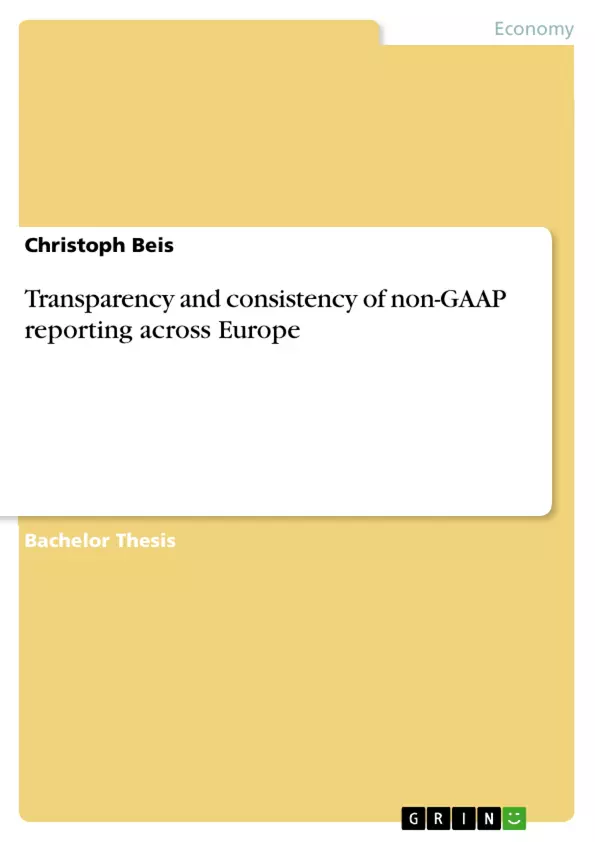
Transparency and consistency of non-GAAP reporting across Europe
Bachelorarbeit, 2017
41 Seiten, Note: 1,0
Leseprobe
Inhaltsverzeichnis (Table of Contents)
- Introduction
- The use of non-GAAP disclosures in financial reporting
- Characteristics of non-GAAP measures
- Ambiguous character of non-GAAP reporting
- Informative character
- Opportunistic character
- The European regulatory environment
- National regulatory environment across countries
- European supranational regulatory environment
- International Financial Reporting Standards
- Empirical evidence about non-GAAP reporting
- Usage of non-GAAP reporting across Europe
- Disclosure of non-GAAP measures
- Adjustments of GAAP measures
- Prominence of non-GAAP measures
- Reconciliations to GAAP measures
- Factors influencing non-GAAP reporting
- Macroeconomic factors
- Institutional environment
- Economic environment
- The introduction of IFRS
- Company-specific characteristics
- Independence of Board of Directors
- Executive compensation
- Information environment
- Miscellaneous
- Macroeconomic factors
- Usage of non-GAAP reporting across Europe
- Sample study
- Usage of non-GAAP reporting in the investigated companies
- Disclosure of non-GAAP measures
- Adjustments of GAAP measures
- Prominence of non-GAAP measures
- Reconciliation to GAAP measures
- Company-specific characteristics
- Cross-country comparison
- Usage of non-GAAP reporting in the investigated companies
Zielsetzung und Themenschwerpunkte (Objectives and Key Themes)
This paper examines the transparency and consistency of non-GAAP reporting across Europe, focusing on how companies use non-GAAP measures in their financial reporting. The study aims to understand the factors influencing the use of non-GAAP measures and to analyze their impact on the transparency and consistency of financial information provided to investors.
- Characteristics and ambiguity of non-GAAP reporting
- European regulatory landscape for non-GAAP reporting
- Empirical evidence on non-GAAP reporting practices in Europe
- Factors influencing the use of non-GAAP measures
- Impact of non-GAAP reporting on transparency and consistency
Zusammenfassung der Kapitel (Chapter Summaries)
The first chapter introduces the topic of non-GAAP reporting, defining its key features and highlighting its increasing popularity both in the U.S. and Europe. It also presents the structure of the paper, outlining the main chapters and their respective focuses.
Chapter 2 provides a detailed analysis of non-GAAP reporting practices, discussing its characteristics, advantages, and disadvantages. It further explores the ambiguous nature of non-GAAP reporting, examining both its informative and opportunistic aspects.
Chapter 3 focuses on the European regulatory environment for non-GAAP reporting. It describes the national regulatory landscape across different countries, emphasizing the differences in regulations. It then moves on to discuss the supranational regulatory environment, highlighting the role of the European Securities and Markets Authority (ESMA).
Chapter 4 presents empirical evidence on non-GAAP reporting practices across Europe. It analyzes the usage of non-GAAP measures, including their disclosure, adjustments, prominence, and reconciliation to GAAP measures. It also explores the factors influencing non-GAAP reporting, focusing on macroeconomic and company-specific characteristics.
Chapter 5 examines European annual reports with a focus on the transparency and consistency of non-GAAP reporting practices. It compares the findings to previous research and analyzes the cross-country variations in non-GAAP disclosures.
Schlüsselwörter (Keywords)
Non-GAAP reporting, transparency, consistency, European financial reporting, regulation, empirical evidence, factors influencing non-GAAP reporting, cross-country comparison.
Frequently Asked Questions
What are non-GAAP measures in financial reporting?
Non-GAAP measures are financial figures that are not defined by accounting standards (like IFRS) but are used by companies to provide an alternative view of their performance.
Why are non-GAAP disclosures considered "ambiguous"?
They can be informative by providing a clearer picture of core operations, but also opportunistic if used to hide losses or inflate earnings by excluding certain costs.
What role does ESMA play in European non-GAAP reporting?
The European Securities and Markets Authority (ESMA) provides guidelines to ensure that non-GAAP measures are presented transparently, consistently, and with proper reconciliations.
Do non-GAAP reporting practices vary across Europe?
Yes, the study shows that usage and adjustments vary significantly across different European countries, industries, and even over time within the same company.
How does executive compensation influence non-GAAP reporting?
Individual factors, such as the determination of variable pay for executives, can be a major driver for the usage of specific non-GAAP figures to meet bonus targets.
Details
- Titel
- Transparency and consistency of non-GAAP reporting across Europe
- Hochschule
- Universität Mannheim
- Note
- 1,0
- Autor
- Christoph Beis (Autor:in)
- Erscheinungsjahr
- 2017
- Seiten
- 41
- Katalognummer
- V1268613
- ISBN (Buch)
- 9783346712455
- Sprache
- Englisch
- Schlagworte
- Management Accounting Financial Reporting Financial Disclosure Non-GAAP KPIs
- Produktsicherheit
- GRIN Publishing GmbH
- Preis (Ebook)
- US$ 20,99
- Preis (Book)
- US$ 29,99
- Arbeit zitieren
- Christoph Beis (Autor:in), 2017, Transparency and consistency of non-GAAP reporting across Europe, München, Page::Imprint:: GRINVerlagOHG, https://www.diplomarbeiten24.de/document/1268613
- Autor werden
- Ihre Optionen
- Vertriebskanäle
- Premium Services
- Autorenprofil
- Textarten und Formate
- Services für Verlage, Hochschulen, Unternehmen

- © GRIN Publishing GmbH.
- Alle Inhalte urheberrechtlich geschützt. Kopieren und verbreiten untersagt.
- info@grin.com
- AGB
- Open Publishing
Der GRIN Verlag hat sich seit 1998 auf die Veröffentlichung akademischer eBooks und Bücher spezialisiert. Der GRIN Verlag steht damit als erstes Unternehmen für User Generated Quality Content. Die Verlagsseiten GRIN.com, Hausarbeiten.de und Diplomarbeiten24 bieten für Hochschullehrer, Absolventen und Studenten die ideale Plattform, wissenschaftliche Texte wie Hausarbeiten, Referate, Bachelorarbeiten, Masterarbeiten, Diplomarbeiten, Dissertationen und wissenschaftliche Aufsätze einem breiten Publikum zu präsentieren.
Kostenfreie Veröffentlichung: Hausarbeit, Bachelorarbeit, Diplomarbeit, Dissertation, Masterarbeit, Interpretation oder Referat jetzt veröffentlichen!
- GRIN Verlag GmbH
-
- Nymphenburger Str. 86
- 80636
- Munich, Deutschland
- +49 89-550559-0
- +49 89-550559-10
- info@grin.com
-









